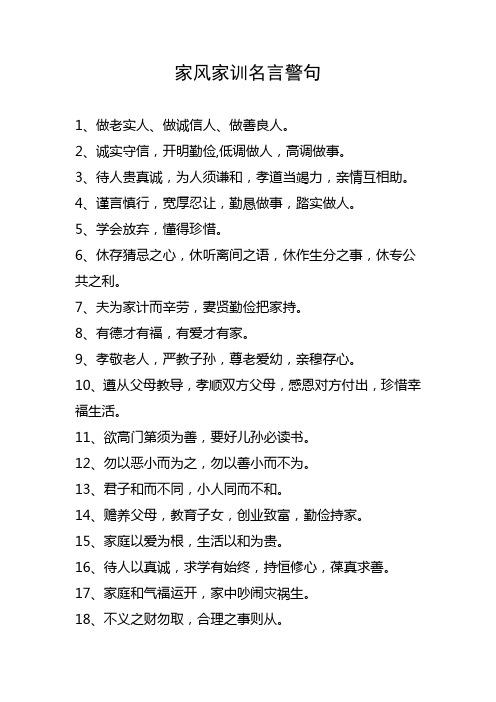2024年1月4日发(作者:文明校园创建方案)

孔子语录系列的中英文对照
一. 为人处世
君子不以言举人,不以人废言。The superior man does not promote a man simply
on account of his words, not does he put aside good words becau of the
man。
工欲善其事,必先利其器。A craftsman who wishes to do his work well must
first sharpen his tools。
君子和而不同,小人同而不合.The superior man aims at harmony but not at
uniformity. The mean man aims at uniformity but not at harmony.
欲速则不达,见小利则大事不成.If you have things done hastily, you will
not reach the goal. If you only e small gains, you will not accomplish
great tasks。
其身正,不令而行;其身不正,虽令不从。When a ruler's personal conduct is
correct, he will be obeyed without the issuing of orders。 If his personal
conduct is not correct, he may issue orders, but they will not be
followed。
岁寒,然后知松柏之后凋也。Only when the year becomes cold do we know how
the pine and the cypress are the last to fade。
见义不为,无勇也。To e what is right and not to do it is want of courage.
见贤思齐焉,见不贤而内自省也。When we e men of worth, we should think
of equalling them; when we e men of a contrary character, we should
turn inwards and examine ourlves。
君子欲讷于言,而敏于行。The superior man wishes to be slow in his speech
and earnest in his conduct.
三军可夺师也,匹夫不可夺志也。The commander of the forces of a large state
may be carried off, but the will of even a common man cannot be taken
from him.
知者不惑,仁者不忧,勇者不惧。The wi are free from perplexities; the
virtuous from anxiety; and the bold from fear.
克己复礼为仁。一日克己复礼,天下归仁焉。为仁由己,而由人乎哉。To subdue
one’s lf and return to propriety, is perfect virtue。 If a man can for
one day subdue himlf and return to propriety, all under heaven will
ascribe perfect virtue to him. Is the practice of perfect virtue from a
man himlf, or is it from others?
君子敬而无失,与人恭而有礼.四海之内,皆兄弟也,君子何患乎无兄弟也。Let
the superior man never fail reverentially to order his own conduct, and
let him be respectful to others and obrvant of propriety:-— then all
within the whole country will be his brothers. What has the superior man
to do with being distresd becau he has no brothers?
君子成人之美,不成人之恶,小人反是。The superior man eks to perfect the
admirable qualities of men, and does not ek to perfect their bad
qualities。 The mean man does the opposite of this。
何以报德?以直报怨,以德报德。With what then will you recompen kindness?
Recompen injury with justice, and recompen kindness with kindness。
巧言乱德。小不忍,则乱大谋。Specious words confound virtue。 Want of
forbearance in small matters confounds great plans。
道不同,不相为谋。Tho who cours are different cannot lay plans for
one another.
二.为政以德
君君,臣臣,父父,子子.There is government, when the prince is prince,
and the minister is minister; when the father is father, and the son is
son.
子为政,焉用杀;子欲善,而民善矣.君子之德风,小人之德草,草上之风必偃。In carrying on your government, why should you u killing at all? Let
your evinced desires be for what is good, and the people will be good.
The relation between superiors and inferiors, is like that between the
wind and the grass。 The grass must bend, when the wind blows across it。
举直错诸枉,能使枉者直。Employ the upright and put aside all the crooked;-— in this way the crooked can be made to be upright.
先有司,赦小过,举贤才。Employ various officers, pardon small faults,
and rai to office men of virtue and talents。。
名不正,则言不顺;言不顺,则事不成;事不成,则礼乐不兴;礼乐不兴,则刑罚不中;刑罚不中,则民无所措手足。If names be not correct, language is not
in accordance with the truth of things。 If language be not in accordance
with the truth of things, affairs cannot be carried on to success. When
affairs cannot be carried on to success, proprieties and music will not
flourish. When proprieties and music do not flourish, punishments will
not be properly awarded。 When punishments are not properly awarded, the
people do not know how to move hand or foot.
如有王者,必世而后仁.If a truly royal ruler were to ari, it would still
require a generation, and then virtue would prevail。
行己有耻,使于四方,不辱君命,可谓士矣.He who in his conduct of himlf
maintains a n of shame, and when nt to any quarter will not disgrace
his prince's commission, derves to be called an officer.
以不教民战,是谓弃之。To lead an uninstructed people to war, is to throw
them away。
不在其位,不谋其政.He who is not in any particular office, has nothing
to do with plans for the administration of its duties。
上好礼,则民易使也。When rulers love to obrve the rules of propriety,
the people respond readily to the calls on them for rvice。
闻有国有家者,不患寡,而患不均,不患贫,而患不安.盖均无贫,和无寡,安无倾。I have heard that rulers of States and chiefs of families are not
troubled lest their people should be few, but are troubled lest they
should not keep their veral places; that they are not troubled with fears
of poverty, but are troubled with fears of a want of contented repo
among the people in their veral places。 For when the people keep their
veral places, there will be no poverty; when harmony prevails, there
will be no scarcity of people; and when there is such a contented repo,
there will be no rebellious upttings。
、
三. 人生态度
性相近也,习相远也.By nature, men are nearly alike; by practice, they get
to be wide apart.
过而不改,是谓过矣。Not to mend the fault one has made is to err indeed。
己所不欲,勿施于人。What you do not want done to yourlf, do not do to
others.
言必信,行必果。Keep what you say and carry out what you do.
君子以文会友,以友辅仁.The superior man on grounds of culture meets with
his friends, and by their friendship helps his virtue。
三军可夺师也,匹夫不可夺志也。The commander of the forces of a large State
may be carried off, but the will of even a common man cannot be taken
from him.
后生可畏,焉知来者之不如今也?A youth is to be regarded with respect。 How
do you know that his future will not be equal to our prent?
有朋自远方来,不亦乐乎? Is it not delightful to have friends coming from
distant quarters?
人不知而不愠,不亦君子乎?Is he not a man of complete virtue, who feels
no discomposure though men may take no note of him?
父在,观其志.父没,观其行。三年无改于父之道,可谓孝矣。While a man's father
is alive, look at the bent of his will; when his father is dead, look
at his conduct。 If for three years he does not alter from the way of his
father, he may be called filial。
不患人之不己知,患不知人也。I will not be afflicted at men’s not knowing
me; I will be afflicted that I do not know men.
诗三百,一言以蔽之,曰:思无邪。In the Book of Poetry are three hundred
pieces, but the design of them all may be embraced in one ntence-—
"Having no depraved thoughts."
关睢乐而不淫,哀而不伤。The Kwan Tsu is expressive of enjoyment without
being licentious, and of grief without being hurtfully excessive.
父母在,不远游,游必有方.While his parents are alive, the son may not go
abroad to a distance。 If he does go abroad, he must have a fixed place
to which he goes。
德不孤,必有邻。Virtue is not left to stand alone。 He who practis it
will have neighbors。
吾十有五而志于学,三十而立,四十而不惑,五十而知天命,六十而耳顺,七十而从心所欲,不逾矩。 At fifteen I t my heart upon learning。 At thirty,
I planted my feet firm upon the ground。 At forty, I no longer suffered
from perplexities。 At fifty, I knew what were the biddings of Heaven。
At sixty, I heard them with docile ear。 At venty, I could follow the
dictates of my own heart; for what I desired no longer overstepped the
boundaries of right。
贤哉回也!一箪食,一瓢饮,在陋巷,人不堪其忧,回也不改其乐。贤哉回也!
Incomparable indeed was Hui! A handful of rice to eat, a gourdful of
water to drink, living in a mean street。 Others would have found it
unendurably depressing, but to Hui’s cheerfulness it made no difference
at all. Incomparable indeed was Hui。
知者乐水,仁者乐山。知者动,仁者静.知者乐,仁者寿。The wi find pleasure
in water; the virtuous find pleasure in hills. The wi are active; the
virtuous are tranquil。 The wi are joyful; the virtuous are long-lived。
逝者如斯夫,不舍昼夜。It pass on just like this, not ceasing day or
night!
食不厌精,脍不厌细。He did not dislike to have his rice finely cleaned,
nor to have his minced meat cut quite small。
非礼勿视,非礼勿听,非礼勿言,非礼勿动。Look not at what is contrary to
propriety; listen not to what is contrary to propriety; speak not what
is contrary to propriety; make no movement which is contrary to propriety。
人无远虑,必有近忧。If a man take no thought about what is distant, he
will find sorrow near at hand。
君子有三戒。少之时,血气未定,戒之在色。及其壮也,血气方刚,戒之在斗。及其老也,血气既衰,戒之在得。There are three things which the superior
man guards against. In youth, when the physical powers, are not yet
ttled, he guards against lust。 When he is strong and the physical powers
are full of vigor, he guards against quarrelsomeness. When he is old,
and the animal powers are decayed, he guards against covetousness.
唯女子与小人,为难养也。近之则不孙,远之则怨。Of all people, girls and
rvants are the most difficult to behave to. If you are familiar with
them, they lo their humility。 If you maintain a rerve towards them,
they are discontented。
四. 求知求学
有教无类。In teaching there should be no distinction of class.
当仁,不让于师。When it comes to benevolence, one need not give precedence
even to his teacher.
学而时习之,不亦说乎? Is it not pleasant to learn with a constant
perverance and application?
温故而知新,可以为师矣.If a man keeps cherishing his old knowledge, so as
continually to be acquiring new, he may be a teacher of others.
学而不思则罔,思而不学则殆。Learning without thought is labour lost;
thought without learning is perilous.
敏而好学,不耻下问。He was of an active nature and yet fond of learning,
and he was not ashamed to ask and learn of his inferiors。
十室之邑,必有忠信,如丘者焉,不如丘之好学也。In a hamlet of ten families,
there may be found one honourable and sincere as I am, but not so fond
of learning.
知之者,不如好之者,好之者,不如乐之者。They who know the truth are not
equal to tho who love it, and they who love it are not equal to tho
who delight in it.
默而识之,学而不厌,诲人不倦,何有于我哉.The silent treasuring up of
knowledge; learning without satiety; and instructing others without
being wearied -- which one of the things belongs to me?
我非生而知之者,好古,敏以求之者也.I am not one who was born in the
posssion of knowledge; I am one who is fond of antiquity, and earnest
in eking it there.
三人行,必有我师焉。择其善者而从之,其不善者而改之。When I walk along with
two others, they may rve me as my teachers. I will lect their good
qualities and follow them, their bad qualities and avoid them.
学如不及,犹恐失之。Learn as if you could not reach your object, and were
always fearing also lest you 。

本文发布于:2024-01-04 10:43:23,感谢您对本站的认可!
本文链接:https://www.wtabcd.cn/zhishi/a/170433620445995.html
版权声明:本站内容均来自互联网,仅供演示用,请勿用于商业和其他非法用途。如果侵犯了您的权益请与我们联系,我们将在24小时内删除。
本文word下载地址:孔子语录系列的中英文对照.doc
本文 PDF 下载地址:孔子语录系列的中英文对照.pdf
| 留言与评论(共有 0 条评论) |